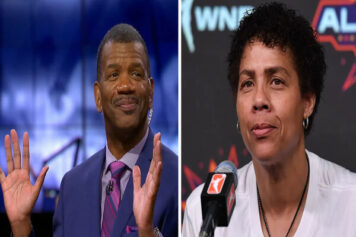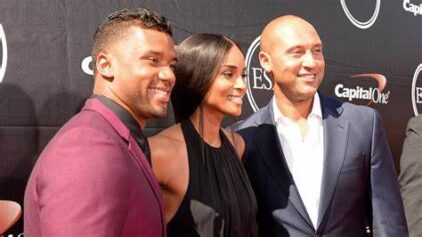Editor's Note: This is a reprint of a column Rob Parker wrote for New York Newsday on July 20, 1998. It was the first time Jeter ever spoke about growing up bi-racial. On Wednesday, Jeter announced that the 2014 season, his 20th in NYC, would be his last.
Derek Jeter had just signed with the Yankees as the sixth pick in the 1992 amateur draft. He was at a restaurant in Kalamazoo, Michigan, his hometown, and after eating with a friend, Jeter returned to the brand new Mitsubishi sports car he had bought with his bonus money. Outside the restaurant, he was confronted by a carload of white teenagers, around the same age as him, 18.
"Take your dad's car back home, nigger," one yelled.
In high school, there were also comments from black students he didn't know. Some would say, "He thinks he's white." Others would just walk up to him and start speaking Spanish.
Confused? Many are, but not Jeter.
Jeter, the Yankees' All-Star shortstop, knows exactly what he is. And it isn't any of the above choices. "I'm bi-racial," Jeter said the other day. "People ask if I'm black or white. I'm both. I'm not one race."
Jeter says that the most frequently asked question he gets is not, "Can I have your autograph?" This isn't what you'd expect for a major-leaguer.
It's, "What are you?"
"Fans always want to know what I am," said Jeter, 24. "I've heard everything, even Italian. I don't have a problem with it. People are curious. If you're curious, you ask."
For the record, Jeter's mom is Irish and his dad is African-American. Jeter's look is what throws many people off. He's lighter skinned than an average light skin black person. His hair is wavy, not kinky, giving some the idea that he's Hispanic, like Bernie Williams. And others just think he's an olive skinned white.
If you read Jeter's bio in a recent copy of Sports Illustrated for Kids, you would assume he was black – if you had to guess – from some of his responses.
R&B and Hip Hop were listed as his favorite music. Dave Winfield was his favorite athlete. And his favorite actor was Samuel L. Jackson. "Well, I am black," said Jeter, who often comes up to the plate at Yankee Stadium to George Clinton's funk tune, "Atomic Dog."
The answer wasn't meant to be funny, or wasn't delivered in jest. Jeter's answer is honest. He embraces both parts of himself. Apparently, Jeter, a smart, levelheaded young man, isn't affected by a childhood many can't relate to. In today's world, with the many social difficulties that children and adolescents face, a bi-racial child has an added burden of having to adjust to a world where people see things in just black and white. "Oftentimes, bi-racial kids have difficulties identifying with a specific race," said Ellen Scott, a child psychologist. "The more resilient person can face numerous roadblocks and still come out with a strong sense of self-esteem, sense of identity and personal worth."
Even though Jeter's family lived in a mixed neighborhood, Jeter said his younger sister still had to endure the stares and comments directed at their parents. "Everybody has problems growing up," Jeter said. "It was tough on my parents. That's a whole other story, though.
"You go places and people would look, stare. It bothers you when you're growing up. You go, 'What's the big deal?' You don't see it as a big deal because that's how you grew up, that's all you know. For other people that's maybe not used to seeing that, they'd stare."
Jeter was asked that if he had the choice of being either all black or all white, what would he choose? "Both," he said. "I wouldn't change a thing. I have the best of both worlds."
That might have been easy for Jeter to accept, but not many others. The question of what he is has never gone away. "You're going to get that from some people, regardless," Jeter said. "People are always going to judge you. That's how society is."
Jeter feels it was sports that helped him deal with being "different." "When I was young, I played a lot of sports," Jeter said. "When I played basketball, it was mostly blacks playing. There were mostly white players on the soccer team. And baseball, you had a mix.
"And the thing that helped me out was that I had friends of all races. It's not like I was keeping a tally or anything. I just happened to have friends of all races. I think people relate to me and I just got along with everyone. So it was less than an issue. I don't know what people say behind my back."
In one case, sadly, he later found out there was some name-calling going on when Jeter wasn't looking . When he thinks of it now, it hurts. Some of the abuse came from someone he thought was a friend.
"This was one of my better friends," Jeter recalls. "And I found out later after I graduated from high school, many years later, that he was a bit of a racist.
"He would never say anything to me in my face. But behind my back, not about me, about other people. If he saw a black person walking down the street, he would have something to say."



